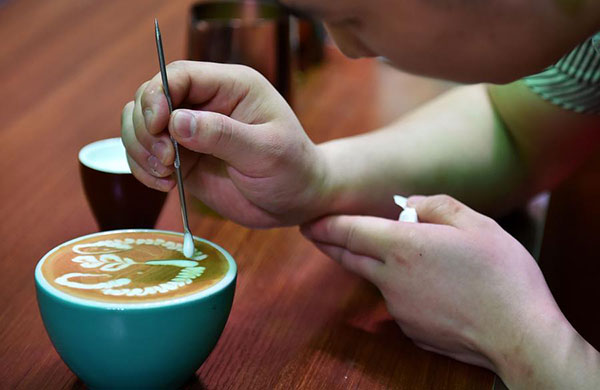
Coffee drinking habits are written into our DNA, a new study suggests, with some people's genetic make-up causing the caffeine hit to be felt more strongly.(Photo/Xinhua)
Coffee drinking habits are written into our DNA, a new study suggests
If you get the jitters after a cup of coffee it could be down to your genes.
Coffee drinking habits are written into our DNA, a new study suggests, with some people's genetic make-up causing the caffeine hit to be felt more strongly.
Researchers at Edinburgh University found that people with a variation in the PDSS2 gene tend to drink fewer cups of coffee.
Experts say the findings suggest that the gene reduces the ability of cells to breakdown caffeine, causing it to stay in the body for longer.
This means that a person would not need to consume as much coffee to get the same caffeine hit, the team says.
Lead author Dr Nicola Pirastu, a Chancellor's Fellow at the University of Edinburgh's Usher Institute, said: "The results of our study add to existing research suggesting that our drive to drink coffee may be embedded in our genes.
"I think that this study reinforces the idea that genetics play a very important role in our everyday habits and lifestyles and understanding this is helping us not only know how people behave but also why, which will allow us to understand how to act on them.
"In this specific case it seems to reinforce the idea that caffeine is probably the main biological driver of coffee consumption".
Researchers looked at genetic information from 370 people living in a small village in south Italy and 843 people from six villages in north-east Italy.
Each of the study participants was asked to complete a survey that included a question about how many cups of coffee they drank each day.
The team found that people with the DNA variation in PDSS2 tended to consume fewer cups of coffee than people without the variation. The effect was equivalent to around one fewer cup of coffee per day on average.
The researchers replicated the study in a group of 1731 people from the Netherlands. The result was similar but the effect of this could be because of the different styles of coffee that are drunk in the two countries, the researchers say.
In Italy, people tend to drink smaller cups such as espresso whereas in the Netherlands the preference is towards larger cups that contain more caffeine overall.
The study is published in the journal Scientific Reports.


















































